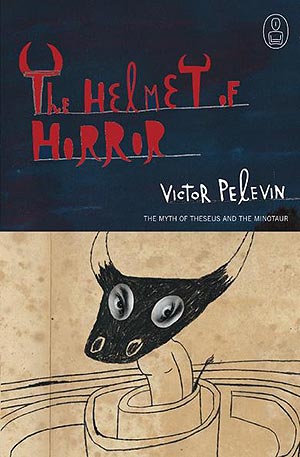 Inadvertently, I expanded my horizons when I bought a copy of Victor Pelevin’s The Helmet of Horror, which was due to a few superficial flaws in the consumer culture embedded in both myself and the used bookstore where I purchased the copy.
Inadvertently, I expanded my horizons when I bought a copy of Victor Pelevin’s The Helmet of Horror, which was due to a few superficial flaws in the consumer culture embedded in both myself and the used bookstore where I purchased the copy.
First off, I probably wouldn’t have bought it, or found it at all, if the bookstore hadn’t combined its horror with its science fiction, creating one large section for the ugly mutants that read “those kinds of books” can shuffle with heads bowed and eyes diverted from looking at any other ugly mutants while the rest of the shoppers pick from “real” literature. Granted, this was a store that had a table ‘curated’ by Chuck “Pencilneck” Klosterman where the store’s supply of Max Brooks’s World War Z was situated (and still going for fifteen bucks a pop. Really? In 2011? C’mon.)
If there wasn’t a horror nerd at the helm, I wouldn’t be sifting through all the TOR paperbacks and Dean Koontz, trying to find something that was horror-based but didn’t involve vampires and/or zombies. Despite its horrific elements, The Helmet of Horror isn’t a straight up horror novel. It’s not a straight up anything type of novel.
On the service, specifically the back cover, it is a “radical reinvention” of the myth involving Theseus, Ariadne and the Minotaur. Inside, it’s a bizarre philosophically driven tale that resembles the ‘Cube’ movies more than a Greek myth. Eight characters are connected to one thread (an internet forum thread) and they are only connected via the ‘internet.’
I enjoy myths and monsters, so I purchased the book. I flipped through the pages and saw that it was structured strictly in ‘dialogue’ or the interaction between each user on the thread. It wasn’t a chat log, mainly because there was no timestamp. The concept of time is a construct solely that of the reader’s mind, which is something that Pelevin enjoys in his literature. He isn’t prone to interviews so what little he has said about his writing style has been translated into “the reader who infuses the text with meaning.”
Translate is the key word here, since it wasn’t until half-way into the book that I discovered that Victor Pelevin is Russian and that this novel was translated by Andrew Blomfield. Which, I could easily chalk up as the reason why I was overwhelmed by the philosophical lasagna that gets served up half-way through the book’s discourse, but in truth, the idea here is that there is clearly a lot of intricate thoughts presented.
This is a book that doesn’t rely heavily on plot, instead focusing on character interaction to drive the story. The dreams by the user Ariadne involving the creature known as Asterisk are the cohesive story-line (a ‘thread,’ if you will) while the interactions of others (the lovers Romeo-y-Cohiba and IsoldA, the drunk Sartrik, the sarcastic Organizm(-: and wise Monstrodomus) allows the reader to create the world that they inhabit.
It’s a bizarre book that requires a couple of reviews to get down completely. I haven’t gotten it down completely. The section that describes the parts of the Helmet of Horror, something too small for anyone to actually wear so to put it on means to BE the Helmet of Horror, is complicated and includes a bit of absurdist flair. The ending is also a bit confusing and requires a deeper analysis. If you start this book, you will breeze through 3/4ths of it with that extra quarter holding you up as you try to understand what happened.
It’s enjoyable. There wasn’t a point where I wanted to put the book down. The interactions are enjoyable to read and Pelevin has done a lot of research when it comes to the history of labyrinths and how they relate to each character in this story. It’s not a strictly horror tale but if you like your science fiction coupled with religious imagery and monsters, it’s definitely worth a read.
Plus, it’s good to reach out and read different works from different countries. I don’t know Russian from Greek but thankfully, Pelevin has his work translated to English. It also had me look up The Master and the Margarita. Make your Sunday Reading an international one.
